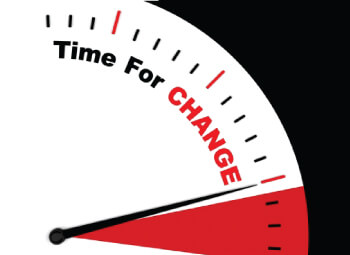I remember once reading that “making change after age 30 requires monumental effort.” Maybe you agree that doing it at any age requires effort, because change (usually) isn’t easy. As midlife and boomer women, we’re at the age when we can make changes that may ultimately improve our health, and both improve and lengthen our lives and their quality. I don’t want to live an extraordinarily long time if I’m not living “the good life,” and to me that means continuing to be active—and I’m really active—and having good mental health and cognition. It’s not about a “good life” with lots of money and material things.
It’s about time

I recently faced up to changes I had to make in my life. I’ve been putting off one of them for years and always knew that someday, I’d have to pay the piper. That’s what happens when we reach a certain age: Things that we’ve done in our younger years, when “being older” seemed like “never,” eventually catch up with us as an inevitable part of the aging process. We deal with the “cumulative effects” of what we’ve done or not done. And sometimes those effects are irreversible. For some, it starts in their 40s, and for many, major problems don’t manifest until their 80s. “When” is determined by not only genes, but by the life we’ve all led.
Taking change to heart
Cardiovascular disease is part of my genetic makeup on both sides of the family. I’ve been on a “mild” dose of anti-hypertensive medication for 20 years. My top or systolic number has been creeping up, in spite of my daily workouts and my below-normal body weight. When it crept up to dangerous levels recently, I knew I had to make a change. There was one thing I could do to stop the harmful rise that would otherwise ultimately damage blood vessels in my body and in my brain—and I do fear stroke and dementia. Don’t you? Sure enough, when I made that change, my pressure suddenly lowered to the normal range—for the first time in years. I stopped doing something I really enjoyed, but which was not my friend. Sometimes we have to sever those ties.
Change is gonna’ come
Do I miss the thing I kissed goodbye? Yes. Was it, is it hard? You bet. But when I’m tempted to backslide I think about how I’ll feel about myself—bad—and about the harm I’ve already likely caused and would continue to cause if I didn’t change. I hope it isn’t too late to undo some of it. Making a change that’s “forever” seems daunting, too. I don’t allow myself to think about the “thing,” because that’s not helpful. I just switch my thoughts immediately to another subject and I keep telling myself, “Yes, you can. Yes, you are.” That way, I’m not feeling (too) sorry for myself. To give up? That alternative is just not acceptable. The American Psychological Association suggests:
- Make a plan that will stick.
- Start small.
- Change one behavior at a time.
- Involve a buddy.
- Ask for support.
I’d love to know how you manage and succeed at life changes.
+++++++++++++++++++++++++++++
(Photo courtesy of Stuart Miles at FreeDigitalPhotos.net)